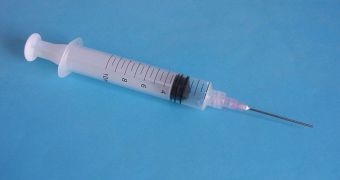Nowadays, approximately 16 billion injections are administered worldwide, every single year. Hospitals all across the globe pay a significant amount of money on utensils manufactured from virgin materials and invest even more in waste disposal.
Waste Management (WM) works in partnership with BD, one of the most important manufacturers of medical equipment in the world, to introduce a safer and more efficient way to deal with all the tons of sharps and syringes doctors don't use anymore.
Instead of just dumping them in containers and shipping them to landfills, researchers came up with a more eco-friendly solution to this problem.
This improvement has a significant importance, since studies proved that only the American nation is responsible for gathering 6,600 tons of waste each single day.
Up to 15% of this impressive pile of trash is represented by items which are considered “biohazard.”
This issue is half way solved now, since the collaboration will provide an earth-friendly way to sterilize and renew the plastics and metal used to manufacture sharp materials.
Officials from BD ecoFinity declared that they are now able to recycle up to 70 percent of the entire amount of medical utensils which was destined to end up in landfills.
Their partner, WM makes its presence visible by collecting the boxes filled with used sharps and so the entire recycling process starts.
The individuals who deal with the boxes don't actually open them so the entire process is risk-free.
The items collected in containers suffer the influence of high temperatures and then they are shredded. Next step is the separation of metal from plastic.
The plastic obtained during this recycling process will end up contributing to the manufacturing of more such containers, that will be distributed and used in hospitals and clinics all across the US.
While these facilities cope with the company's efforts of recycling in a more responsible way, the cycle will continue.
Even though one might tend to think that such actions don't actually have a significant impact on a national level, the BD program proved its efficiency after experts reflected that the partner companies managed to derive 38,000 pounds of sharp waste from landfills every year.
Such a strategy, expanded to more and more hospitals, would certainly represent a win-win situation.
Purchasing medical equipment manufactured from virgin materials is much more expensive than utensils obtained from recycled items.
By paying less for equipment, hospitals and clinics will have a bigger budget available for other kind of projects. The savings are considerable, if we think about the fact that such facilities spend almost $10 billion for waste disposal every year, only on the American continent.

 14 DAY TRIAL //
14 DAY TRIAL //